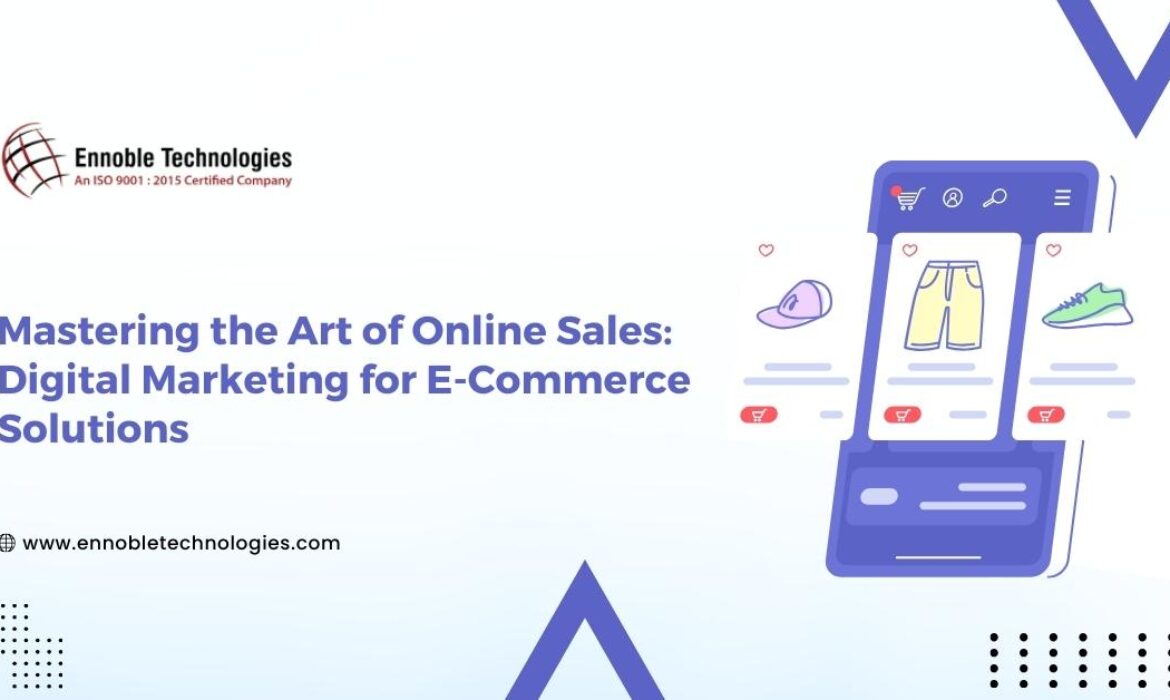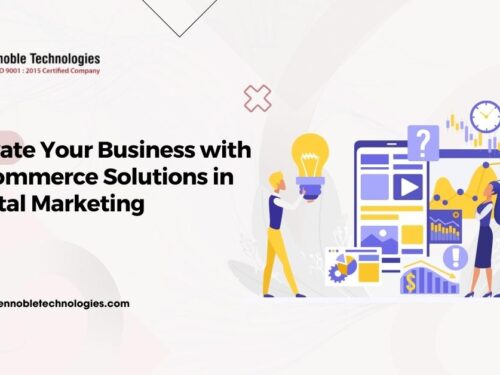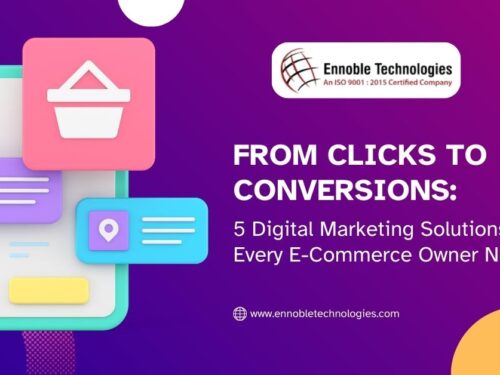Mastering the Art of Online Sales: Digital Marketing for E-Commerce Solutions
In the fast-paced world of e-commerce, the ability to sell products and services online has become paramount for businesses aiming to thrive in the digital age. To succeed in this highly competitive landscape, mastering the art of online sales through effective digital marketing strategies is essential. In this comprehensive guide, we will explore the key principles and strategies that will help you elevate your e-commerce game and leave your competitors in the dust.
Understanding the E-Commerce Landscape
The Rise of E-Commerce
The first step to mastering online sales is understanding the rapid growth of e-commerce. In recent years, the e-commerce industry has experienced exponential growth, with consumers increasingly turning to online shopping for convenience, variety, and competitive pricing. According to recent statistics, global e-commerce sales are expected to reach a staggering $4.5 trillion by the end of this year, making it an undeniable force in the business world.
The Competitive Challenge
With the growth of e-commerce comes increased competition. Thousands of e-commerce websites are vying for consumer attention, and standing out in this crowded marketplace can be a daunting task. However, with the right strategies, you can rise above the competition and capture your target audience effectively.

Building Your Digital Presence
The Importance of a User-Friendly Website
Your e-commerce website is your virtual storefront, and it needs to be inviting, easy to navigate, and optimized for conversions. Start by ensuring that your website loads quickly, has a clean and intuitive design, and is mobile-responsive. A user-friendly website can significantly impact your bounce rate and overall sales.
Search Engine Optimization (SEO)
To leave other websites behind and rank high in Google, a robust SEO strategy is essential. Conduct thorough keyword research to identify the terms your target audience is searching for, and optimize your website’s content accordingly. Utilize meta descriptions, alt tags, and high-quality backlinks to boost your website’s visibility on search engine results pages (SERPs).
Content Marketing for E-Commerce
Creating Engaging Product Descriptions
When it comes to online sales, your product descriptions play a crucial role. Craft compelling, detailed, and keyword-rich product descriptions that not only inform but also persuade potential buyers. Highlight the unique selling points of your products and address common pain points your customers may have.
Blogging and Educational Content
Incorporate a blog into your e-commerce website to provide valuable, informative content to your audience. Create blog posts that address industry trends, offer how-to guides, and provide solutions to common problems related to your products or services. This not only establishes your authority in your niche but also drives organic traffic to your website.
Leveraging Social Media
Social Media Advertising
Harness the power of social media to reach a wider audience. Utilize platforms like Facebook, Instagram, and Twitter to run targeted advertising campaigns. These platforms offer advanced targeting options, allowing you to reach users based on demographics, interests, and online behavior.
Engaging with Your Audience
Building a strong social media presence also involves engaging with your audience. Respond promptly to comments and messages, run contests and giveaways, and showcase user-generated content. Building a community around your brand can lead to loyal customers who advocate for your products or services.

Email Marketing Strategies
Building a Subscriber List
Email marketing remains one of the most effective ways to nurture leads and drive sales. Build a subscriber list by offering incentives such as discounts or exclusive content in exchange for email addresses. Segment your list to send targeted and personalized emails based on user behavior and preferences.
Drip Campaigns and Personalization
Implement drip email campaigns that guide potential customers through the sales funnel. Personalize your email content to address the specific needs and interests of each recipient. A well-crafted email sequence can significantly increase conversion rates.
Data Analytics and Continuous Improvement
Monitoring and Analytics Tools
To stay ahead in the e-commerce game, you must continually monitor your website’s performance and marketing efforts. Use analytics tools like Google Analytics and e-commerce tracking to gather data on user behavior, conversion rates, and sales. Analyze this data to identify areas for improvement.
A/B Testing and Optimization
Don’t settle for mediocre results. A/B testing allows you to experiment with different elements of your website, email campaigns, and advertising to determine what works best. Continuously optimize your strategies based on the insights gained from testing.
Data-Driven Decision Making
Data is the lifeblood of effective digital marketing. Leverage advanced analytics tools and platforms to gather actionable insights about your audience, sales funnel, and website performance. Analyze data on customer behavior, conversion paths, and user demographics to make informed decisions.
Predictive Analytics
Consider implementing predictive analytics to forecast future trends and customer behavior. By identifying patterns and trends in historical data, you can optimize inventory management, marketing campaigns, and product recommendations.
Personalization and AI
Artificial intelligence (AI) and machine learning can take your e-commerce personalization efforts to the next level. Use AI algorithms to deliver tailored product recommendations, personalized email content, and dynamic website experiences based on individual customer preferences and behavior.
Chatbots and Virtual Assistants
Integrate AI-powered chatbots and virtual assistants into your website to provide instant support and assistance to customers. These tools can answer common questions, guide shoppers through the purchase process, and enhance the overall user experience.

Video Marketing
Video content has become increasingly popular in e-commerce. Create engaging product videos, tutorials, and demonstrations to showcase your products in action. Platforms like YouTube and TikTok offer opportunities for video advertising and product reviews.
Affiliate Marketing
Explore affiliate marketing partnerships with bloggers, influencers, and content creators in your niche. Affiliates can promote your products to their dedicated audiences, driving targeted traffic and sales to your e-commerce store.
Voice Search Optimization
As voice-activated devices become more prevalent, optimize your website for voice search. Focus on long-tail keywords and conversational search queries to align with how users interact with voice assistants like Siri and Alexa.
Retention Marketing
While acquiring new customers is important, retaining existing ones is equally crucial. Implement customer loyalty programs, subscription services, and personalized offers to keep your customer base engaged and coming back for more.
Social Commerce
Take advantage of social commerce features on platforms like Instagram and Facebook. These platforms allow users to discover and purchase products directly within their social media feeds, providing a seamless shopping experience.
Cross-Selling and Upselling
Increase your average order value by implementing cross-selling and upselling strategies. Recommend complementary products or offer upgrades to customers during the checkout process. This can significantly boost your revenue per transaction.

Legal and Compliance Considerations
Ensure that your e-commerce business complies with all relevant laws and regulations, including data protection and consumer rights. Display clear privacy policies and terms of service on your website to build trust with customers.
Continuous Testing and Improvement
Never stop testing and optimizing your e-commerce strategies. Run A/B tests on various elements of your website, email campaigns, and advertisements to identify what resonates best with your audience. Incremental improvements can lead to substantial long-term gains.
In closing, the world of e-commerce is dynamic and ever-evolving. To truly master the art of online sales, it’s essential to stay agile, embrace innovation, and remain customer-centric in your approach. By incorporating these advanced strategies into your e-commerce arsenal, you’ll be well-positioned to not only rank high in Google but also lead the way in your industry.
360-Degree Product Views
Enhance product listings with 360-degree images or videos that allow customers to fully explore a product from every angle. This immersive experience can reduce uncertainty and increase confidence in purchasing decisions.
Social Proof and User-Generated Content
Encourage customers to share their experiences with your products on social media. User-generated content, such as reviews, photos, and videos, can build trust and credibility with potential buyers.
Artificial Intelligence in Customer Support
Leverage AI-driven chatbots and virtual assistants to provide 24/7 customer support. These AI-powered tools can answer common questions, assist with order tracking, and handle routine inquiries, improving overall customer satisfaction.
Conclusion
Mastering the art of online sales in the e-commerce world requires a multi-faceted approach. By understanding the e-commerce landscape, building a strong digital presence, implementing effective content marketing, leveraging social media, and employing email marketing strategies, you can position your e-commerce business for success. Remember, the key to success lies in continuous improvement and adaptation to the ever-evolving digital marketing landscape.
In summary, the world of e-commerce is constantly evolving, and staying ahead requires dedication and expertise. However, with the right strategies and a commitment to excellence, you can indeed leave other websites behind and achieve remarkable success in the competitive realm of online sales.
Also Read: Healthcare in the Digital Age: Unleashing the Potential of Digital Marketing – Ennoble Technologies
Digital advertising for e-commerce Digital marketing analytics for e-commerce Digital marketing for e-commerce Digital marketing ROI Digital marketing tactics E-commerce advertising methods E-commerce content marketing E-commerce conversion rates E-commerce customer acquisition E-commerce email marketing E-commerce growth strategies E-commerce marketing strategies E-commerce SEO E-commerce social media marketing Mastering e-commerce promotions Mastering e-commerce website optimization Mastering online sales Mastering the Art of Online Sales Online sales best practices Online sales channels Online sales funnels Online sales optimization Online sales techniques






